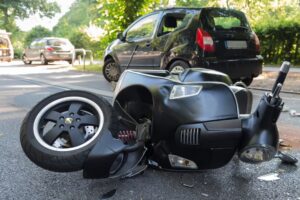Like all road users, motorcyclists have specific rights and responsibilities when navigating traffic. However, when motorcycle accidents occur, it’s usually because other drivers violate road rules or engage in distracted or reckless driving.
If you suffered injuries in a motorcycle accident where another driver failed to yield the right of way, you are not alone. An experienced motorcycle accident lawyer in your area can swiftly investigate your accident circumstances, determine your legal options, and seek the compensation you need for your injuries.
How to Determine Whether a Motorcycle Has the Right of Way
Understanding when a motorcyclist has the right of way is important for safe and lawful riding and determining liability when a driver hits a motorcyclist.
- At Traffic Intersections – Motorcyclists typically have the right of way when they arrive at an intersection first. If multiple vehicles arrive simultaneously, the one on the right usually proceeds first. However, motorcyclists must yield to pedestrians, emergency vehicles, and any vehicles already in the intersection.
- Turning Left – When turning left, motorcyclists must yield to oncoming traffic. However, they can proceed with their left turn if they have a green arrow or a clear, safe gap in oncoming traffic.
- Merging – Motorcyclists merging onto a roadway from a ramp or side street must yield to traffic already on the main road. They should wait for a sufficient gap in traffic before merging safely.
- Lane Changes – Motorcyclists must signal their intent to change lanes and ensure it is safe to do so. They should yield to vehicles already occupying the desired lane and avoid cutting off other drivers.
- Passing – Motorcyclists can pass slower-moving vehicles when it is safe to do so. They should check for oncoming traffic and ensure they have enough space to complete the pass without causing a hazard. However, passing on the right is generally discouraged unless there is a designated lane or sufficient space.
- Pedestrian Crossings – Motorcyclists must yield to pedestrians in crosswalks. Pedestrians always have the right of way, and motorcyclists should come to a complete stop to allow them to cross safely.
- Obeying Traffic Signals and Signs – Motorcyclists must obey all traffic signals, stop signs, and other traffic control devices. Failure to do so can result in accidents.
- Emergency Vehicles – When emergency vehicles are approaching with lights and sirens activated, motorcyclists must yield the right of way and pull over to allow them to pass safely.
By understanding and adhering to these rules, motorcyclists can navigate traffic safely and responsibly while ensuring they have the right of way in appropriate situations.
However, no matter how well motorcyclists comply with traffic laws, they cannot control the conduct of other negligent drivers who might crash into them, causing serious injuries.
When this happens, a motorcycle accident attorney can assess and prove the driver’s liability and seek compensation for the injured motorcyclist.
Types of Accidents that Result When Drivers Fail to Yield to Motorcyclists

When other drivers fail to yield the right of way to motorcyclists, different types of accidents can occur – each posing significant risks to the safety and well-being of motorcyclists.
- Intersection Collisions – One of the most common accidents involving failure to yield occurs at traffic intersections. A collision can happen if a driver fails to yield to a motorcyclist when turning left or right at an intersection. This may result in broadside collisions, also known as T-bone accidents, where the front or side of the other vehicle strikes the side of the motorcycle.
- Merge and Lane Change Crashes – Failure to yield when merging onto a roadway or changing lanes can lead to accidents with motorcyclists. If drivers fail to check their blind spots or signal their intent to merge or change lanes, they may collide with a motorcyclist traveling in the adjacent lane.
- Left Turn Accidents – Drivers making left turns at intersections must yield to oncoming traffic, including motorcyclists. If a driver fails to yield and turns left in front of an oncoming motorcycle, the motorcyclist may collide with the turning vehicle, resulting in serious injuries or fatalities.
- Passing Collisions – When drivers attempt to pass slower-moving vehicles, they must ensure that it’s safe and yield to oncoming traffic, including motorcyclists. A head-on collision may occur if a driver misjudges the distance or speed of an oncoming motorcycle and attempts to pass without sufficient clearance.
- Entering and Exiting Driveways – Drivers entering or exiting driveways, parking lots, or alleys must yield to oncoming traffic, including motorcyclists on the roadway. Failure to yield in these situations can result in accidents, as motorcyclists may not have enough time to react or maneuver to avoid a collision.
- Pedestrian Crossings – Drivers must yield to pedestrians in crosswalks but must also be vigilant for motorcyclists approaching the intersection. If drivers fail to yield to a motorcyclist at a pedestrian crossing, they may collide with the motorcycle, causing severe injuries or fatalities.
If you suffered injuries in one of these motorcycle accidents, an experienced motorcycle accident attorney in your area can investigate the circumstances and determine your legal options.
Common Injuries in Failure-to-Yield Motorcycle Accidents
When another driver fails to yield to a motorcycle at the proper time, it can result in a range of common injuries for the motorcyclist, varying in severity and effects on their physical health and well-being.
- Head Injuries – One of the most serious types of injuries that can occur in motorcycle accidents is head trauma. If a motorcyclist is struck by a vehicle, they may be thrown from their bike or hit their head on the pavement. This can result in concussions, other traumatic brain injuries (TBIs), skull fractures, and other head injuries, which can have long-term consequences for the victim’s cognitive function, mobility, and quality of life.
- Spinal Cord Injuries – Another common injury resulting from motorcycle accidents is damage to the spinal cord. If a motorcyclist is thrown from their bike or another vehicle hits them, they may suffer spinal fractures, herniated discs, or damage to the spinal cord itself. Spinal cord injuries can lead to paralysis, loss of sensation, and other debilitating impairments that may require lifelong medical care and rehabilitation.
- Fractures and Broken Bones – Motorcycle accidents can also cause fractures and broken bones throughout the body. The force of a collision can result in broken arms, legs, ribs, pelvis, or other bones, depending on how the motorcyclist is struck and the force of the impact. Fractures and broken bones can be painful and may require immobilization, surgery, and physical therapy.
- Road Rash – When a motorcyclist is thrown from their bike during an accident, they may slide across the pavement, resulting in abrasions known as road rash. Road rash injuries can range from minor scrapes and bruises to deep lacerations and tissue damage. In severe cases, road rash can lead to infections, scarring, and permanent disfigurement.
- Soft Tissue Injuries – Motorcycle accidents can also cause soft tissue injuries, such as sprains, strains, and contusions. The force of impact can strain muscles, tendons, and ligaments, resulting in pain, swelling, and limited mobility. Soft tissue injuries may require physical therapy and other forms of rehabilitation to regain strength and function.
In addition to their physical injuries, motorcycle accident victims may also experience severe emotional trauma, such as post-traumatic stress disorder (PTSD). As a result, they may need to attend counseling sessions or treat with a mental health provider.
Proving That Another Driver Failed to Yield in a Motorcycle Crash

Proving that another driver failed to yield the right of way to a motorcyclist in an accident requires gathering evidence and presenting a compelling case to demonstrate the other driver’s negligence.
Here are some important steps your motorcycle accident attorney can take to build a case and prove a drive failed to yield:
- Police Report – Obtain a copy of the police report filed at the scene of the accident. The report will document details of the accident, including statements from witnesses, assessments of fault, and any citations issued to the motorists involved. If the report indicates that the other driver failed to yield, it can provide crucial evidence that proves your case.
- Witness Statements – Collect statements from any witnesses who observed the motorcycle accident. Eyewitness testimony can provide valuable insight into what happened leading up to the collision and who was at fault. Witness statements can corroborate your version of events and strengthen your claim of the other driver’s failure to yield.
- Video Footage – If available, obtain video footage of the motorcycle accident from surveillance cameras, dashcams, or nearby businesses. Video evidence can provide clear documentation of the accident and help support your claim that the other driver failed to yield.
- Traffic Laws and Regulations – Present violations of traffic laws and regulations relevant to the accident. If the other driver violated traffic laws by failing to yield, it can strengthen your case for negligence.
- Expert Testimony – Seek expert testimony from accident reconstruction specialists or traffic safety experts. These professionals can analyze the evidence and provide expert opinions on how the accident occurred and whether the other driver failed to yield the right of way.
- Medical Records – Document your injuries and medical treatment resulting from the accident. Medical records can provide evidence of the severity of your injuries and the effects of the collision on your physical health and well-being.
By gathering and presenting compelling evidence, your lawyer can effectively prove that another driver failed to yield the right of way in an accident. This evidence can strengthen your case and support your claim for compensation.
Recovering Damages Following a Motorcycle Accident

In a failure-to-yield accident involving a motorcyclist, compensation may cover the damages the rider suffered.
Here are the most common types of compensation that motorcyclists may recover in such cases:
- Medical Expenses – Motorcyclists injured in failure to yield accidents may recover compensation for medical expenses incurred due to their injuries. This includes reimbursement for hospital bills, medication expenses, surgical costs, rehabilitation fees, and other related medical care.
- Lost Income – If the motorcyclist cannot work due to their injuries, they may recover compensation for lost earnings – or loss of earning capacity.
- Pain and Suffering – Motorcyclists may also recover compensation for the pain and suffering they endured because of the accident. This includes physical pain, emotional distress, mental anguish, and loss of life enjoyment stemming from the collision and resulting injuries.
- Permanent Disability and Disfigurement – If the motorcyclist suffers permanent disability or disfigurement due to their accident, they may be entitled to compensation for these long-term consequences. This includes compensation for the effect of the injuries on their ability to perform daily activities, pursue hobbies, and engage in social interactions.
- Property Damage – Motorcyclists may also recover compensation for damage to their motorcycle and other personal property resulting from the failure to yield accident. This includes reimbursement for repair costs or the fair market value of the motorcycle if it is deemed a total loss.
- Loss of Consortium – In cases where the motorcyclist’s injuries affect their relationships with their spouse or family members, they may recover compensation for loss of consortium. This includes compensation for the loss of companionship, affection, support, and assistance.
- Punitive Damages – In cases of extreme negligence or intentional misconduct by the at-fault driver, punitive damages may punish the wrongdoing and deter similar behavior. Punitive damages deter rather than compensate the victim.
An experienced motorcycle accident lawyer in your area can determine the compensation you may recover in your case. They can then take the appropriate steps on your behalf to maximize your overall settlement or award.
Speak with an Experienced Motorcycle Accident Lawyer Right Away
If you suffered injuries in a motorcycle crash that resulted from another driver’s failure to yield, you have legal rights and options. An experienced personal injury attorney in your area can file a claim with the appropriate insurance company on your behalf, negotiate with adjusters, or, if necessary, pursue litigation in court for you.
Seek your free, no-obligation case evaluation with a nearby law firm today.